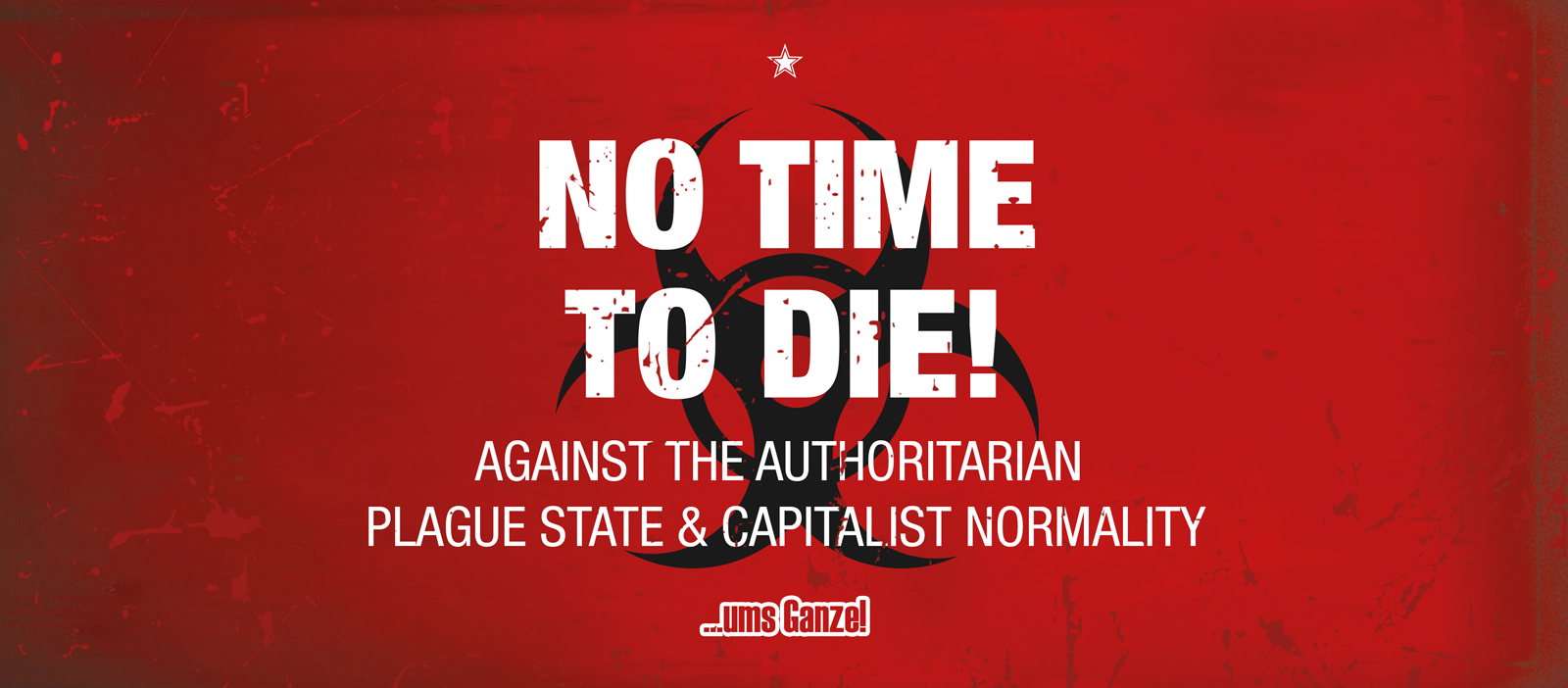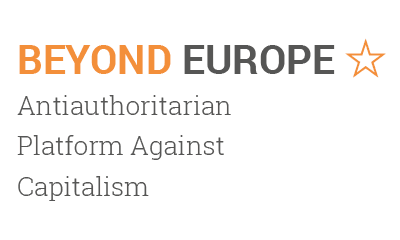Translation of our statement on the current Corona-Crisis.

We will feed each other, re-distribute wealth, strike.
We will understand our own importance
from the places we must stay.
Communion moves beyond walls.
We can still be together.
(Britney Spears/Mimi Zhu)
What many thought impossible just two weeks ago has become reality: The corona virus is spreading internationally, the capitalist machine is faltering. And the bourgeois state is taking action. It should come as no surprise that in Germany, too, parliament and government do everything the monopolist on the use of force has in store: the protection against epidemics has always been the area where the nation state could demonstrate to its citizens that it is indispensable. What is now being democratically implemented is a dream come true for all fans of authoritarian politics – and all too often has little to do with health policy. Whether their names are Söder, Klöckner or Kramp-Karrenbauer: Border closures, curfews, contact ban, police deployment of the German Armed Forces inside the country, stop of humanitarian refugee admissions and soon compulsory work for asylum seekers, are being carried out almost incidentally. It is not very reassuring that the fascist agitators of the AfD have little to say at the moment. The reason for this is that in the still ongoing initial phase of democratic crisis management the grand coalition is single-handedly pushing through the country’s isolation. The „Yes“ to the „Luftbrücke“ (Airlift) makes this clear: The state is bringing back 100,000 stranded German tourists with airplanes, but refusing entry to 20,000 refugees on the Greek islands, who are acutely threatened with death there. For this murderous racist logic of nationalism, no tips from the right-wing opposition are needed.
The dead and the undead system
The irrationality of capitalism becomes all the more apparent in the crisis: when meetings of more than two people are banned except at work, capitalism shows that it will go over dead bodies for its survival. The biggest corona parties do not take place illegally in playgrounds or parks, but are state-sponsored: every day in open-plan offices, Amazon fulfillment centers and the country’s factories, as well as, not to be forgotten, in the refugee housing facilities where the state cramps the unwanted people together. What would really help – the interruption of normal operations – is, however, highly controversial. While the World Health Organization warns against a resumption of production, not only autocrats such as Donald Trump and the Brazilian President Bolsonaro are counting on trivializing the problem, but also the German Health Minister Jens Spahn. May they differ in their argumentation and choice of words, the result is essentially the same: accepting deaths in order to get the national economy back on its feet. And to do it before anyone else does, because this is the only way an advantage can be gained in the global market competition. And even though many more people will die in Brazil and the USA than in Germany – the world champion country in respiratory care – the question arises here and there, what kind of a broken society sells the measures for resuming all kinds of work as reasonable and at the same time tries to persuade people that the only thing that counts is their private, self-responsible actions as citizens? The radical left demands what really helps at this point: the abolition of the obligation to work and the interruption of all economic activities which are not absolutely necessary for the basic supply of people now. We must fight to ensure that wages are safeguarded and that people do not have to go to work. Collective solutions for wage losses and new forms of action on the shop floor must be fought for.
Crisis of production, society and politics
The virus has triggered a capitalist crisis of production and at the same time a crisis of society, or more precisely: of social reproduction. The economy was not, however, plunged into crisis by the virus as such – it is only the trigger to which the immanently crisis-ridden capitalism with its latent financial bubble, its industrial over-accumulation and its fragile supply chains now reacts by severely interrupting production. Nature and society are not contradictory: the spread of the coronavirus is ultimately the result of the capitalist mode of production in agriculture and livestock farming. There is neither a naturalness nor a mode of production which is outside the capitalist relationship. The global economic crisis that is now beginning is as real as the virus itself, which must be fought with a poorly organised health system. The condition of the latter, broken by the perseverance of neo-liberal austerity and capitalisation, requires reactions like #flattenthecurve and leads to a bad compromise between virus control and economic rescue. The left must make it clear that the crisis of capital does not necessarily have to be identical with the crisis of society or, for that matter, the crisis of people dying from the virus. Only if it succeeds in this can the corona crisis become a political system crisis. On the other hand, it should refrain from accusing the state of some dark conspiratorial bio-power games – the virus is real, the threat is real. The fight against the virus is itself a vital state interest, because citizens dying of Corona question the sovereignty of the state. But the left should also refrain from speaking out in the wake of state measures to privatise the health crisis. Of course it is right to keep distance, wash your hands and wear a face mask. But left-wing politics does not consist of giving tips on how to behave to others; the state, as the monopolist on the use of force, can handle that on its own. The left muss endure and not misinterpret the contradiction that both the people and the authoritarian state have a shared interest in fighting the virus. The state does this out of the interest of maintaining production. Instead, it must build political pressure and make radical demands: Expropriate companies and billionaires, and pay workers in care, health and nursing appropriately. The mainstream discourse on „systemically relevant professions“ should be gratefully received and sharpened. On the one hand, we must point out that it is predominantly women who are in charge of these areas: nurses, supermarket sellers, teachers. On the other hand, we must point out that systemically relevant work is not to be had for nothing. A little nightly applause from the balcony is cynical [In german cities currently people are „thanking“ helpers by clapping at 9pm] if it does not lead to political consequences. In the former case it is nothing more than an ideological maneuver pretending that women have only been keeping reproduction going since the beginning of the crisis, whether in reproductive jobs or afterwards at home. Moreover, it is women, whether „systemically relevant“ or not, who are disproportionately affected by violence in the private sphere. For some, #staythefuckhome means the opportunity to learn artful pottery, for others it is a domestic hell of violence. For the left, making systemic relevance clear must mean emphasizing the role of reproduction. In this respect, it is once again true: feminism is class war.
Open the borders – save lives!
All over the world the nation states – like Europe – are closing down their borders. The national community suddenly appears again as the only obvious, natural and plausible one. There is a retreat into the national as a narrative of non-ideological solidarity of a considerably expanded charitable community. However, this narrative is actually that of the objective „community of fate“ of the citizen collective: who happens to have a German health insurance card is well off, unlike those with an Italian or Spanish one. The fact that after the last crisis in 2008 Germany forced a brutal austerity course on other countries once again proves to be murderous. After all, countries like Italy and Spain have had to cut back on their health systems under pressure from the German „black zero“ policy. It is no coincidence that it is these two countries where thousands of people are dying these days – and not in Germany. It is only a small step being the crisis winner in 2008 to the ventilation world champion in 2020. In the current situation, the most important thing is therefore to break through the rampant nationalism of self-care and stand up for those who have neither passport nor health insurance card. The central demand of the radical left must be to stop the humanitarian disaster in Moria on Lesbos and provide medical care for the people crammed together and distribute them among the EU member states so that they too can be protected from infection.
Future
No matter how long it lasts: after the crisis will not be like before the crisis. But it is not clear whether social democratic models with state-capitalist aspects, which have been frowned upon for a long time, will prevail, or whether economic liberals with an authoritarian framework will prevail in order to help undead neoliberalism over the next cliff. Whether all this is accompanied by models of public social control in the South Korean way, or whether new economic forms and changed consciousness are perhaps emerging here and there – will not be negotiated after the crisis, but now. The fact is: capital fractions, such as those of the supply services or pharmaceutical companies, are profiting from the crisis. Amazon, for example, recently advertised 100,000 jobs. And the way in which we work in the future is also being renegotiated: Will the home office remain a low-cost workplace for capital? How will short-time work change the income situation? And how is capital dealing with the slump in the low-wage sector? Far-reaching changes are imminent that can only be won through well-organized struggles.
To find something something good in the current situation seems cynical to us. Nevertheless, the result of the crisis could at least be that the necessities a reasonably society should satisfy are more clearly evident. With the gradual dawning of the public’s recognition that the professions in the care sector are „systemically relevant“, the debate on care revolution, women’s strikes and the labour disputes of health care workers can be linked to this. This also applies to the neighborhood mutual aid that is beginning to emerge in many places, which could be developed into solidarity-based district structures if it were possible to politicize them. They could form a pole from below to support the emerging struggles for wages, the distribution of reproductive work and rent – what Adidas can do with its rent strike, so can we. The current wave of solidarity, which also includes the neighbourhood work of various leftist initiatives and collectives, has to be expanded in order to win these struggles. Today, more than ever, anti-national criticism means scandalising the racist isolation of Germany and Europe from refugees at the national borders.
It is bad enough that we humans die and become ill naturally. But there is no reason to further duplicate this problem socially by continuing to place human needs under the constraints of the „second nature“ of capitalist irrationality. Against the authoritarian administration of epidemics in the service of business location and competition, we therefore wield communism as a countervailing power from below. Not as a distant light at the end of the tunnel, as a utopian ideal in dark times, but as a practical movement against the normal execution of capitalism that produces sick people, seeks scapegoats and literally walks over masses of corpses in hospitals as well as at the borders. What else could stop it now?
…ums Ganze! Alliance
March 29th, 2020









